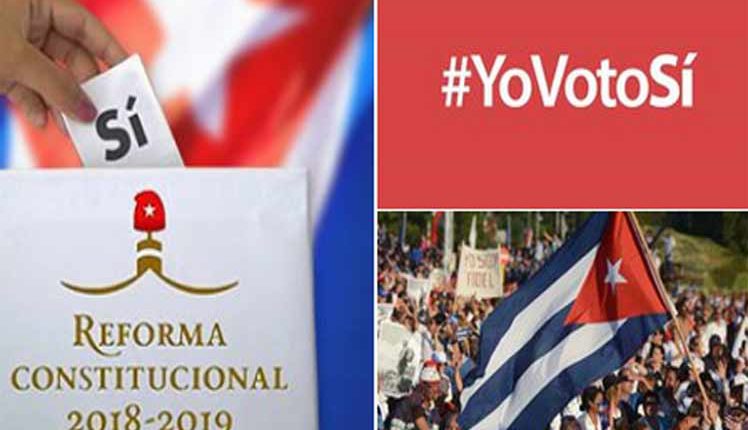
Cuba’s constitutional reform: Yes, but plenty of nos
HAVANA – For good or better, after the referendum on February 24, the Cuban electoral authority has recognized some results that, at least, should tickle some.
We must first highlight, much more than the expected victory of the ‘Yes’ vote in favor of reformulation of the constitution, the sudden visualization of a new citizen landscape, in which everything is no longer of the same color — nothing is rose-colored, nor are all the waters tame.
For example, the fact that 198,674 Cubans took the trouble to get out of bed that Sunday just to deposit a blank ballot at their polling stations says a lot. The figure represents a mere 2.53 percent in the preliminary count. It doesn’t seem important, but do not be fooled, because another 127,100 voters cancelled their ballot — 1.62 percent. Together then, 4.15 percent of those who exercised the right to vote: 325,774 Cubans who went to the polls, left their ballots blank or simply annulled them.
And still I have yet to address those who voted ‘No.’ As many as 706,400 Cubans, or about nine percent, chose to vote ‘No’ instead of heading for the beach that morning. The fact is that nine percent of anything is a significant number. It’s actually a whole bunch of Cubans saying ‘No’ to something.
What’s most surprising is the fact that 706,400 Cubans voted ‘No,’ 127,100 refused to vote, and another 198,674 simply left their ballots blank. That adds up to more than one million voters. Again, more than one million Cuban voters went to the polls to express themselves, and not in the way they were told to do so… And they spoke loudly!
And if we include those who did not participate, because out of a universe of 8,669,714 voters, 7,848,343 cast ballots, on Sunday 821,371 potential voters decided not to cast ballots, either because they were not in the country, could not go to polling place, or simply decided not to participate. Therefore as many as 1,853,545 Cubans — 21.37 percent of all possible voters — voted ‘No,’ in whatever form you want to describe it.
In a country where until very recently everything was done by almost absolute majority, and by show of hands, and where even the parliament, most of the time, still approves almost all things unanimously, and that suddenly a quarter of the voters say what was not expected of them, is a sign that without a doubt something has begun to change in Cuban society.
Those who expected to see in these votes something other than a referendum on the constitution, and assumed it would be a vote for or against the Revolution, must now return to the drawing board. More than 20 percent of Cubans, a fifth of those of legal age, said ‘No.’
If that is not a signal, then nothing else is. According to official results, an important and not negligible part of the population has refused to sign over a blank check to the government clearly stating that the golden age of unanimous approval has ended.
We are assuming, of course, that the great majority, the 75.29 percent who voted ‘Yes,’ voted their conscience and with hope, and did not do it automatically, or by pure commitment, or against their opinion, sacrificing his or her personal criteria in order to maintain the much needed unity. Likewise, we assume that the nine percent who voted ‘No’ did it consciously and not as a punishment vote.
Perhaps we are assuming too much, or badly. Who really knows?
These results — the more than 75 percent who said ‘Yes’ — were obtained after a massive and sustained advertising campaign in favor of the ‘Yes.’ The ‘No’ did not have television, radio or public spaces at their disposal. At this point we will never know what would have happened if those who wanted the ‘No’ had been granted some legal space to debate their side.
Despite this, the constitutional reform process and its results in the ballot box, as well as the transparency with which they have been reported by the Cuban electoral authorities, are nothing more than a good omen, and perhaps mark the path towards a more democratic society. Especially when one realizes that these are serious results.
These results should be a wake up call for Island nation’s government. Their job now is to seek to improve and refine the way we do things based on people’s expectations.

